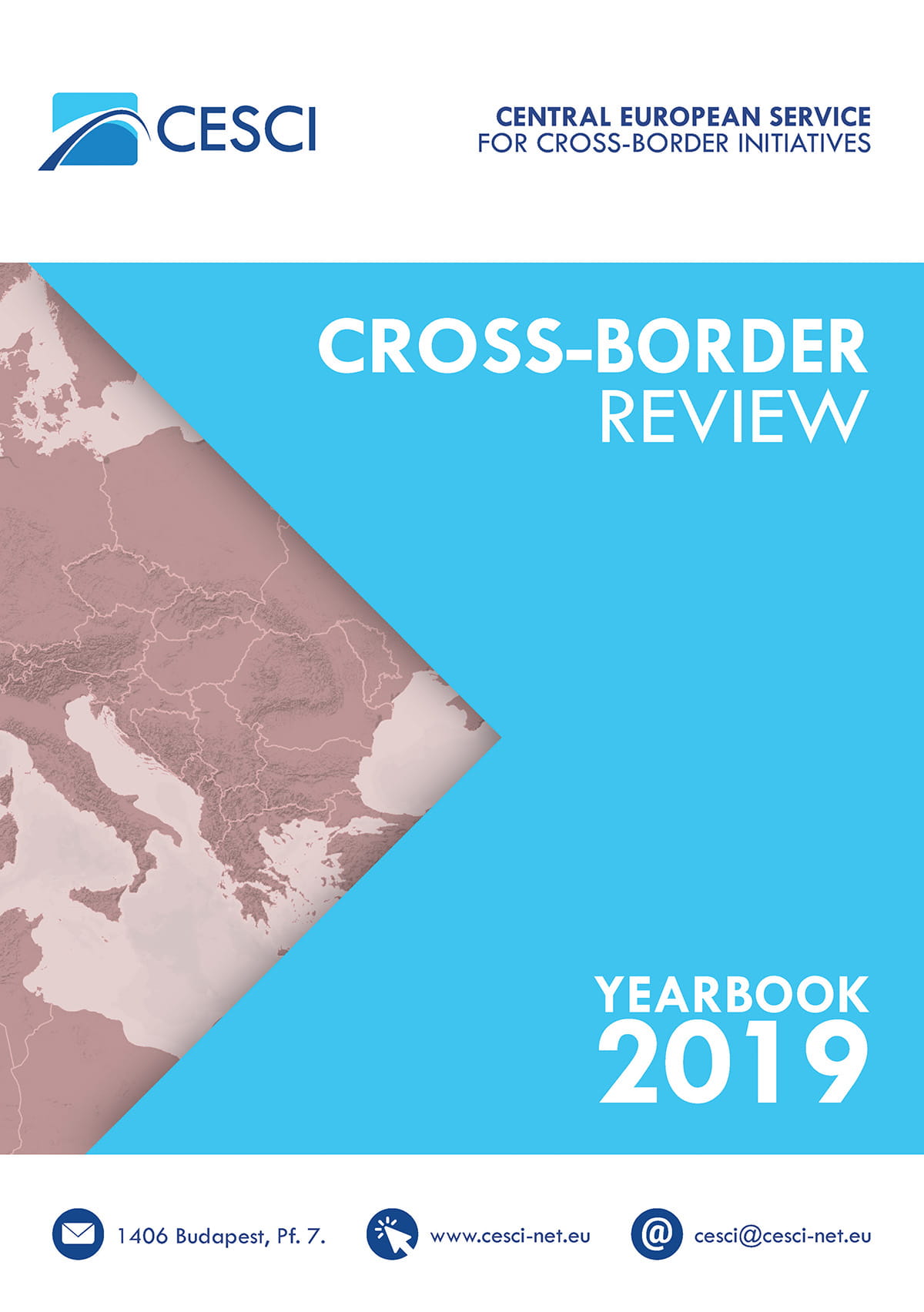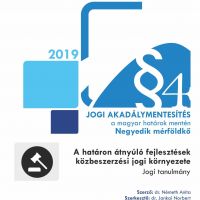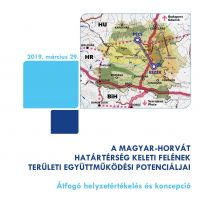
- Editor-in-Chief: James W. Scott
- Publisher: CESCI Europe Institute
- Territory: Europe
- Year of publication: 2019
- Type: Publication
- Language: English
- Number of pages: 186
- ISSN 2064-6704
Cross-Border Review 2019
The ‘Cross-Border Review 2019’ is the sixth edition of the yearbook published by CESCI. The volume contains articles with wide spectrum of border approaches, including scientific, as well as policy-oriented perspectives, and it aims to explore how border studies can reflect social science research ‘that matters’ in terms of social development and intercultural dialogue.
2019 edition of the CESCI yearbook diverges from previous formats in that it brings together different research and policy perspectives regarding the role of socio-political and cultural borders within processes of social interaction.
This edition of the Yearbook focuses on borders as creators and markers of socio-spatial difference and explores how border studies can reflect social science rese-arch ‘that matters’ in terms of social development and intercultural dialogue. The individual contributions represent a rather wide variety of potentital scientifc as well as policy-oriented perspectives on borders that might be the subject of futher development.
Anna Casaglia begins discussion on research perspectives by focusing on the politics of borders which she interprets as products of specific relations between power and space. She proposes an understanding of borders as technologies for the articulation of various controls and the management of flows that are always in a tension between inclusion and exclusion. That this conceptualisation of border significance and impact has inevitable ethical consequences is confirmed by Jussi Laine, who in his chapter reflects on ethical dilemmas of border-making. Laine pursues the question of how to balance calls for freedom of movement and migration against the right to freedom of association and the boundedness of community. Assigning a relative weight to either of these border-related freedoms is problematic as it begs the questions as to whose rights – or wrongs – matter the most. It is this conundrum Laine seeks to unravel by addressing arguments used to support these two apparently mutually exclusive ways of thinking.
Discussion continues with Victor Konrad’s exploration of borders and ‘belongingness’ which offers a theoretical framework based on the concept of mereotopology, presented here as a nexus between borders, territory, and belonging. Evidence regarding components and qualities of belongingness as they relate to borders is provided from different regional settings. Another conceptual approach with similar features is elaborated by James Scott who relates borders and border-making to cognition and sense-making. These examples he develops in his essay derive from changing urban neighbourhood contexts and the everyday geographies they involve. Alicia Español also investigates the cognitive and psychological nature of border-making based on a case study of the Spanish-Moroccan borderland and the cities of Ceuta and Tétuan. Her aim is to understand the ways in which people experience and live with border-crossings in everyday life and, in this way, understand the impact of bordering practices in situations of asymmetry of power, demarcation, and differentiation.
With the essay of Krisztina Keresztély and Hayley Trowbridge our focus shifts to issues of social borders and diversity. The authors describe at some length and detail the experiences of the VOICITYS project which investigated relationships between urban diversity and social dialogue. The project’s concrete aims were to improve social integration through breaking down barriers to conviviality in European neighbourhoods characterized by ethnic and cultural diversity. The project targeted: 1) sustainable communication and integration between different social groups and 2) deepening dialogue between policy-makers, stakeholders and citizens as a means of promoting more efficient diversity management. Questions of diversity and social borders are then elaborated in a more specific case by Goran Brandov and Bruno Cunha who present a study of Portuguese Africans. As the authors argue, Portuguese Africans represent an ethnicity in its own right that has achieved considerable social and cultural expression and a degree of ‘politicization’ though embryonic forms of collective action. Brandov and Cunha pursue questions regarding the relative positionalities of old and new Portuguese Africans vis-à-vis ‘mainstream’ society. Their hybrid identity of double cultural reference has kept them at the margins but there are signs of change are emerging.
The Yearbook closes with research notes and book reviews that relate more directly to the phenomenon of cross-border cooperation. Alle Sanchenko reviews the current status of formal frameworks conditioning Ukraine’s participation in cross-border Cooperation. At first glance, much progress has been made in drafting appropriate legislation. However, she also points to the serious multilevel coordination challenges that remain. Sanchenko suggests that the EGTC (European Grouping for Territorial Cooperation) instrument could serve as an important tool for improving cooperation providing appropriate legal, normative and regulatory acts are prepared and expertise followed. In his study of the Pomoraví Euroregion, Michal Šindelář concludes that despite structure cooperation mechanisms, obstacles to deeper cross-border cooperation prevail. In addition to the language barrier, there is a shortage of key actors able to generate cooperation momentum and stimulate communication. Moreover, few benefits accrue to member municipalities of the Euroregion. Interest remains low despite funding opportunities, and there is no development strategy. This begs a question of Euroregion relevance other city networks show that cross-border cooperation is possible without such an institution.
Finally, Teodor Gyelnik and Gyula Ocskay review two recent books that investigate different aspects of cross-border cooperation.
European Territorial Cooperation. Theoretical and Empirical Approaches to the Process and Impacts of Cross-Border and Transnational Cooperation in Europe, edited by Eduardo Medeiros. The book offers a highly detailed and varied assessment of 30 years of experience with European Territorial Cooperation. The contributors are recognised experts, representing policy-oriented and academic research in the study of Territorial Cooperation and borders more generally.
The second book, The Poverty of Territorialism. A Neo-Medieval View of Europe and European Planning was authored by the recognised planning scholar Andreas Faludi. In this book Faludi advocates a post-national perspective: planning has progressed in ways that lay bare the limitations of state-centred notions of democracy and territoriality. According to Faludi, a new border transcending political paradigm is needed in order to develop planning in terms of a global governance approach to society and space.
Contents
- James W Scott: Developing Research Perspectives on Borders, Cultural Dialogue and Cooperation
ARTICLES
- Anna Casaglia: On Border-Making and Politics of Borders
- Jussi Laine: Observations on Borders as Social Fact and Ethical Problems
- Victor Konrad: Relating Borders to ‘Belongingness’: Some Observational Evidence
- James W Scott: Urban Borders, Urban Neighbourhoods and a Cognitive Approach
- Alicia Español: Everyday Psychological Boundaries: Evidence from the Ceuta-Tétuan Borderland
- Krisztina Keresztély, Hayley Trowbridge: Voicitys: Living with Diversity in European Cities
- Goran Bandov, Bruno Antonio Erdeljac Cunha: Portuguese-Africans: in Practice a True ethnicity
RESEARCH NOTES
- Alla Sanchenko: Current Institutional and Legal Framework for Ukraine’s Participation in Cross-border Cooperation
- Michal Šindelář: The Pomoraví/Weinviertel/Zahorie Euroregion
BOOK REVIEWS
- Andreas Faludi (2018): The Poverty of Territorialism: a Neo-Medieval View of Europe and European Planning, Edward Elgar Publishing. (Teodor Gyelnik)
- Eduardo Medeiros (ed) (2018): European Territorial Cooperation. Theoretical and Empirical Approaches to the Process and Impacts of Cross-Border and Transnational Cooperation in Europe. Springer. Cham. (Gyula Ocskay)
Authors
Prof. Goran Bandov, Dag Hammarskjöld University College of International Relations and Diplomacy, Zagreb, Croatia
Dr. Anna Casaglia, University of Trento, Italy
Dr. Bruno Antonio Erdeljac Cunha, Dag Hammarskjöld University College of International Relations and Diplomacy, Zagreb, Croatia
Dr. Alicia Español, University of Seville, Spain
Dr. Teodor Gyelnik, CESCI Budapest, Hungary
Dr. Krisztina Keresztély, Comparative Research Network, Berlin, Germany
Prof. Victor Konrad, Carleton University, Ottawa, Canada
Dr. Jussi Laine, Karelian Institute, University of Eastern Finland, Joensuu, Finland
Gyula Ocskay, CESCI Budapest, Hungary
Dr. Alevtyna Sanchenko, National Academy of Sciences of Ukraine, Kiev
Dr. hab. James W. Scott, Karelian Institute, University of Eastern Finland, Joensuu, Finland
Dr. Michal Šindelář, Masaryk University, Brno, Czech Republic
Hayley Trowbridge, People’s Voice Media, Salford, UK

